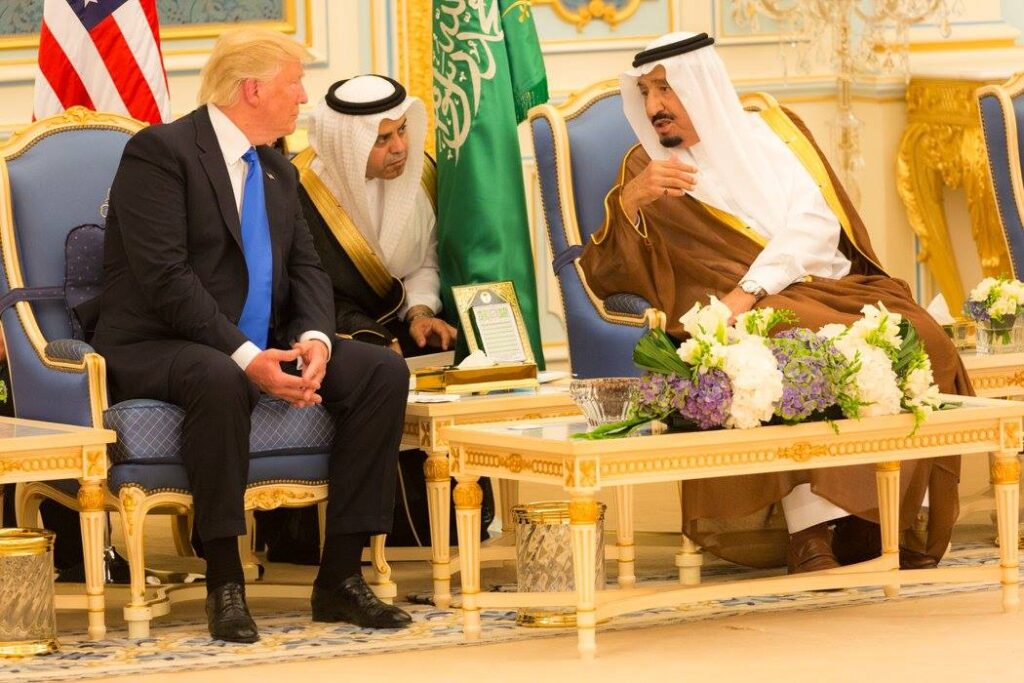Congress Must Act On Huge Saudi Arms Sales
Posted on

President Trump and King Salman bin Abdulaziz Al Saud
Congress should use its considerable power under U.S. law to compel Trump administration officials to answer a basic question about the $110 billion package of arms sales to Saudi Arabia: Does it serve the U.S. national security interest at this specific time? If the answer is no, then Congress should oppose it.
While many may not know it, Congress possesses considerable authority to block an arms sale that lawmakers view as unwise, unwarranted, or contrary to the national security interests of the United States.
Under the Arms Export Control Act, any senator can file a discharge petition in order to force a full debate and vote on the matter– a mechanism that was last used by Sens. Rand Paul, Chris Murphy, Mike Lee, and Al Franken in September 2016 in an attempt to block a $1.15 billion military export to the Saudis.
Sens. Paul, Murphy, and Franken are reasserting themselves again on defense exports, this time challenging a portion of President Trump’s Saudi arms package, one that includes precision-guided munitions. All three senators cite Saudi Arabia’s indiscriminate bombing in Yemen and failure to distinguish between military and civilian targets as reasons for filing the resolution of disapproval, a concern that has been backed up repeatedly by U.N. human rights monitors and human rights organizations such as Human Rights Watch and Amnesty International. The resolution should be taken up on the Senate floor soon.
Whether you agree or disagree that sending more weapons to the Royal Saudi Air Force is a good idea, surely it’s wise and prudent for Congress to assert itself and actually conduct a debate on this issue before the package is finalized.
President Donald Trump flew out of Riyadh on Air Force One with what looked to be one of the biggest business deals he has ever signed in his life: a $110 billion arms sale meant to provide the Saudi armed forces with some of the world’s most technologically sophisticated military equipment.
This sale “bolsters the Kingdom’s ability to provide for its own security,” according to a White House statement, “and continue contributing to counterterrorism operations across the region, reducing the burden on U.S. military forces.” Indeed, for what the Saudis are receiving—a state of the art anti-missile defense system, precision-guided smart bombs, helicopters, patrol boats, Multi-Mission Surface Combatant ships, armored personnel carriers, and much, much more—it’s easy to see how the total value of the agreement could rise to such an astronomical expense.
And yet lost in this entire conversation, at least in the centers of power in Washington, is whether selling more state-of-the-art weaponry — the fastest fighter planes and the most powerful munitions that are currently available on the market – into a region that is already crawling with weapons, unexploded ordinance, and centuries-old animosities is a smart thing to do as a matter of policy. Parochial considerations and the hefty price tag often overshadow the strategically relevant question: how does a defense sale valued at an unseemly $110 billion serve the U.S. national security interest at this specific time?
If the executive branch isn’t wiling to ask this tough question, Congress should use its considerable power under U.S. law to compel administration officials to provide an answer. The only thing standing in the way the political courage required to leverage that power, courage that has largely eluded Capitol Hill over the last several decades.
Indeed, you can be excused for believing that the legislative branch has no role in this entire process. Far more often than not, arms deals and export licenses are approved with barely any objection from lawmakers on Capitol Hill. And if there are objections, the problems are usually taken care of a letter from the State Department or the Pentagon assuring the lawmaker that his or her concerns are addressed. The entire defense export process codified in the Arms Export Control Act have almost become pro-forma. Thirty days before an arms sale is formally approved, the executive branch notifies Congress about it. Once that notification occurs, Congress typically accedes to the requested sale. Lawmakers in effect have been rubber stamps.
Selling and delivering advanced warheads, F-15 aircraft, naval vessels, and missile defense systems is a serious matter given how these weapons and platforms may be used in a conflict. The State Department may have the authority to propose, initiate, and sign an agreement, but Congress also has a responsibility under the law to ensure that an arms sale serves U.S. national security interests, impacts regional stability in a positive way, and will be used by the buyer in accordance with international humanitarian law and the laws of war.
Sens. Paul, Murphy, and Franken are living up to our Founder’s vision by asserting Congress’s role in this entire process. The separation-of-powers established in the U.S. Constitution, a concept that dictates how the federal government operates, is even more important when it concerns national security. After decades of sitting on the sidelines, Congress now seems to be waking up.
Daniel DePetris is a fellow at Defense Priorities, a Washington thinktank..
Subscribe to our newsletter
Promotions, new products and sales. Directly to your inbox.
